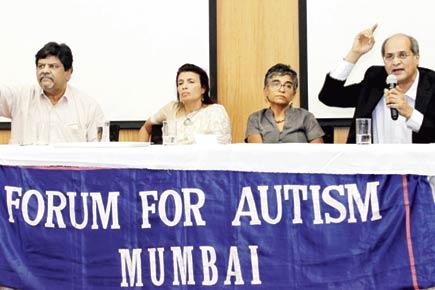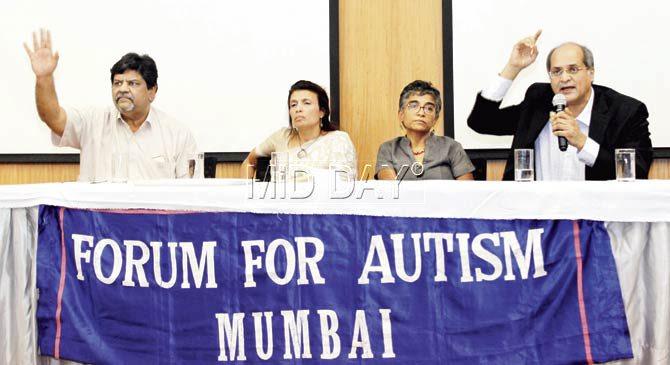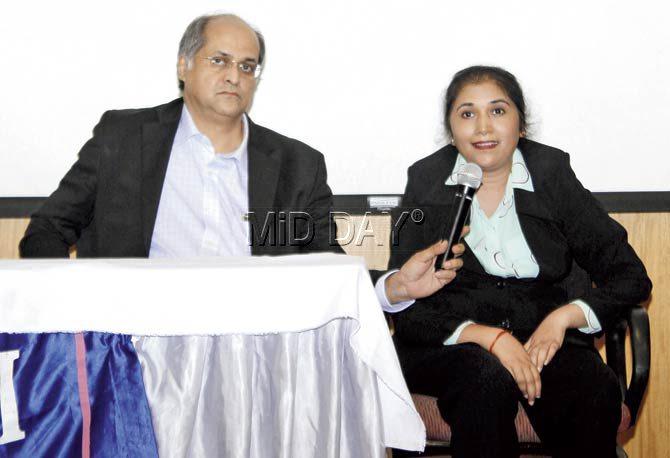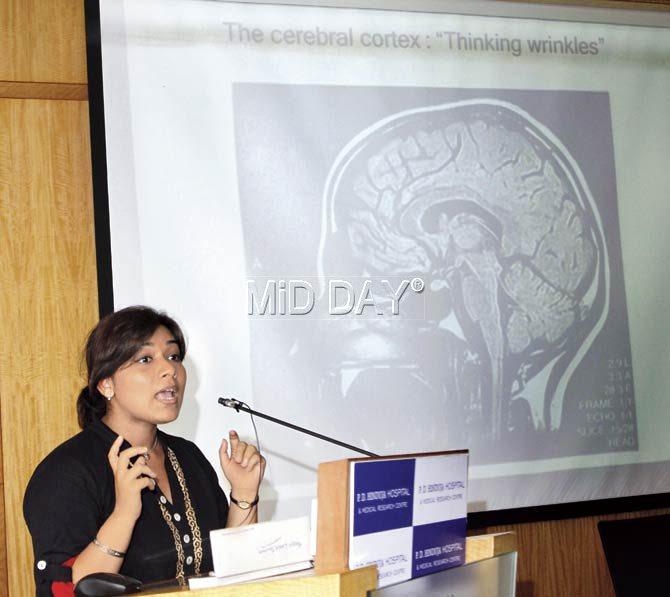Debate, discussion and dissension marks talk about stem cell therapy efficacy in treating Autism Spectrum Disorder

The Forum for Autism, a support group for parents of Autistic children, met at the Hinduja Hospital Auditorium recently, to attend a panel discussion on stem cell therapy, being touted ‘cure’ for Autistic Spectrum Disorder. The event saw a good turnout at the fourth floor venue of the Mahim facility.
ADVERTISEMENT

(from l) Dr Vrajesh Udani, Dr A Hegde, Dr V Krishnamurthy, Dr A Sharma. Pics/Tushar Satam
Parents of Autistic children, the caregivers who sacrifice so much, some with tears brimming just beneath their eyelids an indication of hope, pride, joy mixed with a sliver of fear and pain, thronged the auditorium to listen to experts talk about the pros and cons of the therapy.

Dr A Sharma, with ALS afflicted Dr H Sane
Parul Kumtha, president, Forum for Autism, stated that the Forum was grateful to the medical profession, “for holding our hands. We, as parents, many with children now in their late teens and 20s, have several ways to address what our children faced.

Is the personal. T Dias makes a moving point
We have looked at so many treatments, alternate therapies like music, hydrotherapy, massages... we have looked at medical treatments like with B12, B6 plus Magnesium Vitamin B, C & A. We have tried Gluten free diets. Now we are going to discuss stem cell therapy, as part of medical therapy.”
Kumtha had a word of caution or advice for the audience not to make this into a “personal consultancy. We are here to discuss the larger issue.” Slides were used throughout as props for the presentation. First speaker, neurologist Dr Anaita Hegde’s address was about cells and what they essentially are.
After basic information about cells, Dr Hegde outlined the rapid strides Science has taken saying, “growing stem cells in labs, culturing them. What is a cancer cell? It is a cell that has gone astray. It multiplies rapidly and that is why it is so difficult to treat. We are learning to study Autism from the stem cells of those that have autism.
Stem cells are also used in retinal problems for people. The new treatment for baldness now is stem cells,” said the doc, eliciting smiles and some gents in the audience touched their thinning air self-consciously.
In the end, Dr Hegde said that though stem cells have fantastic potential, “we are still not in total control about how we can use these cells. Nevertheless, stem cells have given us tremendous hope for a better understanding of the diseases we treat.” For Dr Alok Sharma, neurosurgeon, an analogy using beverages was helpful to make a point.
“We will all have differing points of view. We use healthy cells to replace damaged ones. There are two types of major stem cells the embryonic stem cell and the adult stem cell. I like to think that the former is like alcohol and the latter like homemade orange juice, how can the latter be dangerous? while the former may be so.”
After some laughs, the doc cast an eye on the world scene saying, “The global scenario is changing so quickly. Our PM, Narendra Modi is the biggest supporter for research on stem cell therapy. Coming to the big question about how safe is this treatment? Three are some side effects like one can have convulsions and seizures. Yet, I would say that adult stem cell therapy is a safe treatment, but, convulsions it has been seen are a possible side effect.”
Power
Moving away from the strictly medical, Dr Vibha Krishnamurthy, paediatrician brought the focus back on parents. She said sharing information about stem cell therapy will help parents, “to become empowered consumers. They must feel like they have the ability and knowledge to make decisions.”
Kumtha touched a chord when she interspersed between panelists saying about experimenting with different cures, “the fear all parents live with is that: are we making guinea pigs of our children? Are we really doing the right thing? when told to try different therapies.”
Even as there were murmurs of agreement from the audience. Dr Vrajesh Udani’s, paediatric neurologist, address comprised two aspects, efficacy and affordability. “We have to do more research about stem cell treatment, I want to tell parents that try it only if it is not high on the wallet (very steep) and medically safe.”
There was edge-of-the-seat anticipation when scientist Tatyana Dias, (UK) who works at the Gurdon Institute in Cambridge took the mike. “she straddles both worlds,” said Kumtha. Dias mixed the personal with the professional, stating that she had an Autistic sister who, “passed away two months ago, making this the most difficult period of my life.
She was the one that made our family complete,” said the scientist about her 26 year-old sibling. She told the parents, “I feel your angst and pain. All your kids including my sister have very, very special talents. “Dias said that they did not opt for stem cell treatment for her sister, “it was pointless, we do not know its efficacy as yet.
There is no evidence of that,” said Dias who added that she had made it her life’s mission, “to see that adults with autism find a job.” Dias then brought a somber note to proceedings, stating that, “As a family, one of our biggest fears was what if my sister outlived me and my parents? Who would look after her then?”
The Forum members shifted in their chairs, indicating that the sentiment resonated with them. Yet, it was not all doom and gloom, Dias ended saying that, “You have all done and are doing an amazing job. You deserve a pat on the back. Autism is incredibly hard, in the end, you must have enough information to make the right choices for treatment.”
The stimulating evening culminated in a peppy panel discussion where the focus was on physician Dr Hemangi Sane, who is herself suffering from Amyotrophic Lateral Sclerosis (ALS). Sane was a strong advocate for stem cell therapy, eliciting applause when she said, “I am here, living only because of stem cell therapy.
I was supposed to survive for three to five years, today I have survived for 11 years and I do not think I am going anywhere,” she said to loud applause, adding that, “My condition has not deteriorated for the past seven years. I could not wait for evidence about stem cell therapy.”
There were spirited arguments on the panel for and against stem cell therapy, with queries about the cost of treatment and warnings about commercialization. The meet went well beyond the two hours. It is a divided house when it comes to stem cell therapy but discussion and dissension are an intrinsic and necessary part of medical discourse.
Both for doctors and the ultimate stakeholders in this the loving parents of Autistic children. It is their conflicts and hope for that one cure we can only try to understand, whose courage we can only salute.
What is ALS?
Amyotrophic Lateral Sclerosis (ALS) is a progressive neurological disease that causes muscle weakness and gradually impacts the functioning of the body, leading to eventual death. It is also referred to as motor neuron disease or Lou Gehrig's disease, named after the famous baseball player who had the condition.
About Autism
When people refer to 'Autism' they are usually talking about Autism Spectrum Disorders (ASD), which are five complex, brain-based disorders that affect a person's behaviour as well as social and communication skills. They are developmental disabilities that cause substantial impairments in social interaction and communication. Many people with ASDs also have unusual ways of learning, paying attention, and reacting to different sensations. An ASD begins before the age of 3 and lasts throughout a person's life.
 Subscribe today by clicking the link and stay updated with the latest news!" Click here!
Subscribe today by clicking the link and stay updated with the latest news!" Click here!






